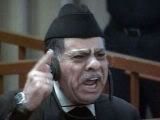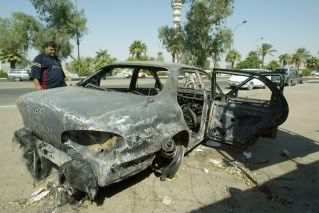Is there such a thing as a ‘just war’? The problem with that question is that when we answer ‘yes’, we end up in a world where there is ‘just war’–just war as an ultimate solution to every problem, whether it be terrorists, international diplomacy, drugs in our streets or bugs in our gardens. War becomes the default setting for all of our responses. War becomes the measure of manhood and the definer of strength. War constrains our imaginations and limits our intelligence.
A chemical farmer sees a bug in his field, and declares war. Out come the poisons and the sprays, the herbicides and the neurotoxins, dangerous and costly.. Kill the enemy! The result–poison on the vegetables, beneficial insects die, some pests always survive, making the problem worse.
An organic farmer sees a pest, and says, “Hmmn, here’s an interesting piece of information. Something in the system is out of balance. Perhaps some mineral is lacking in the soil, that’s weakening the plants. What can I do to shift the balance, to create conditions that will favor the beneficial bugs that will keep the pests in check?” Result–increased fertility, clean and nutritious vegetables, bright flowers growing among the fields, reduced damage to crops and increased health for farmworkers and consumers.
Our policy in the Middle East and Afghanistan, for decades, has been that of the chemical farmer–kill the enemy, and anything else that might happen to be in the vicinity, including civilians and potential allies, and when resistance develops, apply more of the same, regardless of cost. Then call it a ‘just war’.
Imagine what our policy might be if, instead, we were guided by the maxim of the clever politician Harry Seldon from Isaac Asimov’s classic science fiction novel, Foundation. “Violence is the last resort of the incompetent.”
We might develop a policy more like that of the organic farmer–looking for the underlying forces that create the imbalance, that favor the development of terrorism and anti-U.S. sentiments. We might look for ways to support and favor the elements within Afghani or Iraqi or Iranian society that make for health, resilience, and liberty instead of employing the force that creates a perfect habitat for resentment, hatred, repression and terror. We might have supported and protected our Kurdish and Shiite allies after the first Gulf War instead of abandoning and betraying them. We might support the women’s organizations in Afghanistan who, even under the Taliban, struggled heroically for women’s rights. We might look at the model of Otpor, a student group who successfully overthrew the dictator Miloscevic using nonviolent resistance–with some strategic help and funding from outside. We might support the nonviolent resistance among the Palestinians, pressure the Israelis to lift the stranglehold siege on Gaza, to restrain their use of disproportionate force and to recognize that their true security can only be gained when Palestinians also have peace, security, and a just recognition of their human rights.
I’m deeply disappointed in Obama, because he is intelligent enough to forge such a policy. However, he operates in a country still controlled by a deep assumption–that strength equals force and violence, that a man who is reluctant to use force is less than a man, that a nation who refrains from wholesale slaughter is ‘weak’. I can’t help but think that his decision to send more troops to Afghanistan has less to do with the ‘justness’ of the conflict and more to do with the politics back home–an attempt to placate his right wing detractors and to look strong in their eyes.
In my futuristic novel, “The Fifth Sacred Thing,” my character Maya says, “For five thousand years, men have been goading each other into acts of brutality and stupidity by calling each other cowards.”
Until we confront that assumption, until we challenge our ‘real men’ and real women to embody a different sort of strength–the strength that nurtures, that heals, that uses intelligence and thoughtfulness and diplomacy to solve problems instead of brute force, until the thought of violence becomes abhorrent to us all, we will have no clear yardstick by which to measure any sort of justice.
Starhawk
Something to ponder on a snowy day.

 Ali Hassan al-Majid, also known as Chemical Ali, will give evidence at the inquiry into the Iraq War
Ali Hassan al-Majid, also known as Chemical Ali, will give evidence at the inquiry into the Iraq War 
 We lead off with the ending of the first part of the
We lead off with the ending of the first part of the